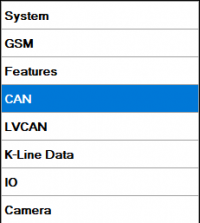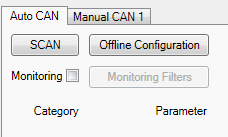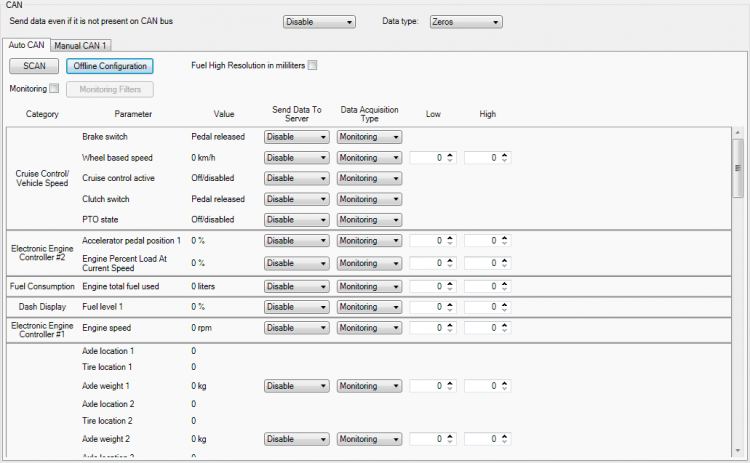Difference between revisions of "Template:FMB630 AutoCAN"
| Line 1: | Line 1: | ||
| − | AutoCAN function allows user to automatically scan for available messages on CAN bus and configure CAN data sending to server. In order to configure AutoCAN connect {{model | + | AutoCAN function allows user to automatically scan for available messages on CAN bus and configure CAN data sending to server. In order to configure AutoCAN connect {{model|FMB630}} to computer with Port ½ cable. Launch {{model|FMB630}} configurator version 1.1.1.7 or higher. Push “Connect“ button, then „CAN“ button. CAN configuration menu will be opened. |
{{{image1|[[Image:FMB630_autoCAN1.png|center|200px]]}}} | {{{image1|[[Image:FMB630_autoCAN1.png|center|200px]]}}} | ||
| Line 5: | Line 5: | ||
* SCAN scans once for available messages on CAN bus; | * SCAN scans once for available messages on CAN bus; | ||
* Monitoring – toggles scanning of messages on CAN bus every 3 seconds; | * Monitoring – toggles scanning of messages on CAN bus every 3 seconds; | ||
| − | * Offline Configuration – enables CAN configuration when {{model | + | * Offline Configuration – enables CAN configuration when {{model|FMB630}} is not connected to CAN bus; |
* Auto CAN tab – configure CAN by selecting available messages from CAN bus; | * Auto CAN tab – configure CAN by selecting available messages from CAN bus; | ||
* Manual CAN tab – Configure CAN by manually entering CAN message ID and data mask; | * Manual CAN tab – Configure CAN by manually entering CAN message ID and data mask; | ||
| Line 11: | Line 11: | ||
{{{image2|[[Image:FMB630_autoCAN2.png|center|250px]]}}} | {{{image2|[[Image:FMB630_autoCAN2.png|center|250px]]}}} | ||
| − | To start CAN configuration push “SCAN“ button. A table of all available CAN messages will appear | + | To start CAN configuration push “SCAN“ button. A table of all available CAN messages will appear. Description of columns: |
* Category – shows CAN message; | * Category – shows CAN message; | ||
* Parameter – shows configurable parameter name; | * Parameter – shows configurable parameter name; | ||
| Line 40: | Line 40: | ||
Monitoring filters menu allows choosing which data will be shown in configuration menu. To enable/disable particular data monitoring use checkbox next to data name. To enable all data monitoring click Select all, to disable all data monitoring click Select none. | Monitoring filters menu allows choosing which data will be shown in configuration menu. To enable/disable particular data monitoring use checkbox next to data name. To enable all data monitoring click Select all, to disable all data monitoring click Select none. | ||
| − | Note: CAN monitoring is {{model | + | Note: CAN monitoring is {{model|FMB630}} configurator function; it does not enable data sending to server. In order to configure data sending to server refer to Configuration section. |
Revision as of 11:22, 1 June 2018
AutoCAN function allows user to automatically scan for available messages on CAN bus and configure CAN data sending to server. In order to configure AutoCAN connect Template:Model to computer with Port ½ cable. Launch Template:Model configurator version 1.1.1.7 or higher. Push “Connect“ button, then „CAN“ button. CAN configuration menu will be opened.
- SCAN scans once for available messages on CAN bus;
- Monitoring – toggles scanning of messages on CAN bus every 3 seconds;
- Offline Configuration – enables CAN configuration when Template:Model is not connected to CAN bus;
- Auto CAN tab – configure CAN by selecting available messages from CAN bus;
- Manual CAN tab – Configure CAN by manually entering CAN message ID and data mask;
To start CAN configuration push “SCAN“ button. A table of all available CAN messages will appear. Description of columns:
- Category – shows CAN message;
- Parameter – shows configurable parameter name;
- Value – shows scanned value of parameter;
- Send data to server – allows to choose the type of data when it‘s generated:
o Disabled – Data will not be collected o On low priority – records will be generated as low priority events; o On high priority – records will be generated as high priority events and immediately sent to server via GPRS (if GPRS is available); o On panic - records will be generated as panic priority events and immediately sent to server via GPRS, if GPRS is not available records will be sent via SMS messages;
- Data acquisition type – allows to choose when records are generated:
oMonitoring – monitors data; oOn change – record is generated when parameter value is changed; oHysteresis – record is generated when increasing parameter value becomes higher than High value, and decreasing becomes less than Low value oEvent on exit – record is generated when parameter value becomes higher than High value or lower than Low value; oEvent on entrance – record is generated when parameter value becomes between High and Low values; oEvent on both – record is generated when parameter value crosses High or Low values;
- Low – allows to choose low value for Data acquisition;
- High – allows to choose High level for Data acquisition;
CAN monitoring
To start CAN bus monitoring mark Monitoring check box. Table of available CAN messages will appear. Data from CAN bus will be updated every 3 seconds. In order to see only desired data open “Monitoring filters” menu.
Monitoring filters
Monitoring filters menu allows choosing which data will be shown in configuration menu. To enable/disable particular data monitoring use checkbox next to data name. To enable all data monitoring click Select all, to disable all data monitoring click Select none.
Note: CAN monitoring is Template:Model configurator function; it does not enable data sending to server. In order to configure data sending to server refer to Configuration section.


